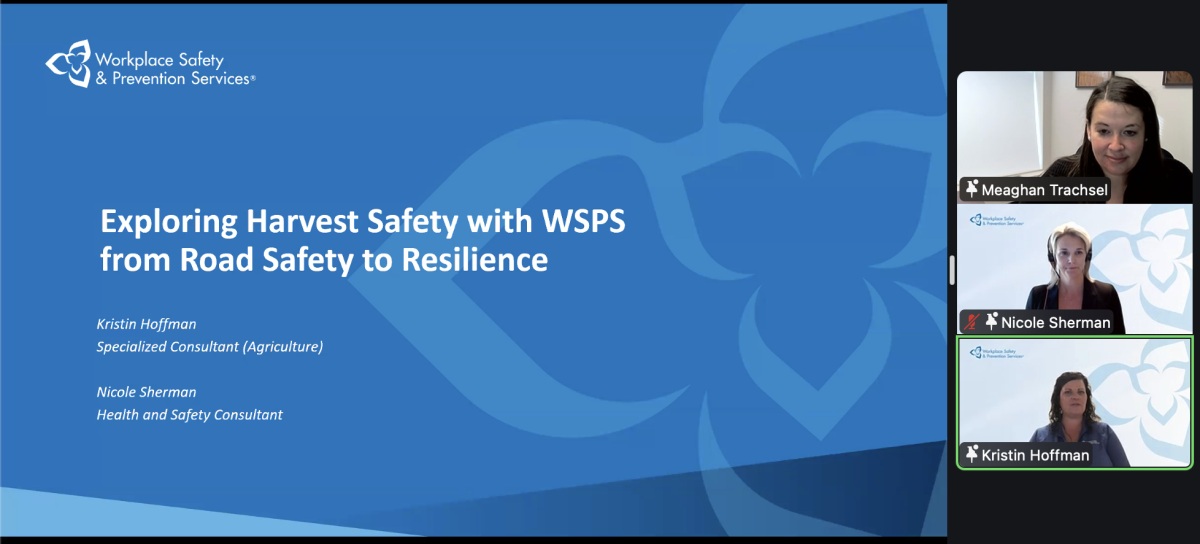An independent British review of organic foods compared to conventionally-grown foods has found “no important differences” in the nutritive content, or in any additional health benefits, for organics.
The “data mining” study, carried out by researchers at the London School of Hygiene and Tropical Medicine (LSHTM) and commissioned by the British government’s Food Standards Agency (FSA), involved a “systematic review” of all papers published in the last 50 years on the nutrient content and health differences between organics and conventional foods.
Results of the study, led by LSHTM’s Dr. Alan Dangour, were published Wednesday in the American Journal of Clinical Nutrition.
Read Also

Exploring Harvest Safety
Kristin Hoffman of WSPS explains measures for increased farm safety around harvest season
“A small number of differences in nutrient content were found to exist between organically and conventionally produced crops and livestock, but these are unlikely to be of any public health relevance,” Dangour said in an FSA release Wednesday.
“Our review indicates that there is currently no evidence to support the selection of organically over conventionally produced foods on the basis of nutritional superiority.”
The review process found 162 relevant articles published, with an English abstract, in peer-reviewed journals between January 1958 and February 2008 inclusive, and found 3,558 comparisons of content of nutrients and other substances.
The study did find marked differences in some nutrients found in greater quantities in organic foods, but also found “no good evidence that increased dietary intake, of the nutrients identified in this review to be present in larger amounts in organically than in conventionally produced crops and livestock products, would be of benefit to individuals consuming a normal varied diet, and it is therefore unlikely that these differences in nutrient content are relevant to consumer health.”
The U.K. market for organic foods has become the third largest in Europe after Germany and Italy, and was estimated in 2007 to be worth over £2 billion, up 22 per cent from 2005 alone, the researchers noted.
Of that, the largest organic sectors are in fruit and vegetables, followed by dairy products, the researchers said. The shift in demand “appears to have arisen at least in part from a belief that organically-produced foodstuffs are healthier and have a superior nutrient profile than conventionally produced foodstuffs.”
No “explicitly systematic” review of the literature studied had been done to date, the researchers said, unlike “non-systematic” reviews which can be “biased and incomplete.
“Systematic reviews cannot improve the quality of published data, but can provide details of the characteristics and quality of studies.”
“Accurate information”
“Ensuring people have accurate information is absolutely essential in allowing us all to make informed choices about the food we eat,” said Gill Fine, FSA’s director of consumer choice and dietary health, in the same release.
“This study does not mean that people should not eat organic food,” Fine emphasized. “What it shows is that there is little, if any, nutritional difference between organic and conventionally produced food and that there is no evidence of additional health benefits from eating organic food.”
The FSA, he said, “supports consumer choice and is neither pro- nor anti-organic food. We recognize that there are many reasons why people choose to eat organic, such as animal welfare or environmental concerns. The agency will continue to give consumers accurate information about their food based on the best available scientific evidence.”
The Soil Association, one of Britain’s leading organic proponents, was quoted in the British farmers’ journal Farmers Weekly as saying it was disappointed with the report’s conclusions.
Peter Melchett, the association’s policy director, told the journal it would be difficult for anyone to come to “far-reaching clear conclusions” in an analysis based on relatively few studies and no “large-scale, longitudinal research.”
Besides, Melchett told Farmers Weekly, consumers who buy organic produce are supporting a system of high welfare standards for animals, increased wildlife on farms and bans on pesticides and routine antibiotics, he added.
And in terms of health benefits, he was quoted as saying “there is not sufficient research on the long-term effects of pesticides on human health.”
The FSA, an independent government department set up in 2000 to protect the public’s health and consumer interests in relation to food, said it “commissioned this research as part of its commitment to giving consumers accurate information about their food, based on the most up-to-date science.”
— The “Editors’ Picks” feature will highlight eyebrow-raising and unusual-yet-true news from the world of farming, as gleaned from various sources by the editorial staff of the Farm Business Communications division.















